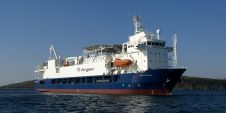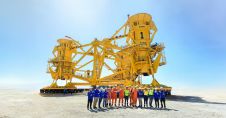Recruit, Train and Retain
In March 2007, a presentation was given at the Offshore Survey Conference 2007. The title of the presentation was ‘Recruiting, Training & Retaining of Personnel in the Offshore Survey Sector of the Oil & Gas Industry’. The theme was working together to ensure the availability of people and skills for the future. The presentation led to some rallying around and the setting up of an industry working group, ‘The Oil & Gas Offshore Survey and Positioning Group’ (OSPG), comprising representatives from across the industry, in an attempt to address some of the issues.<P>
The Group was formed in May2007 to influence and steer actions concerned with the attraction, training and development, and retention of surveying skills and competence within the UK offshore oil and gas industry. In the first instance, the Group would focus on the UK, but it is recognised that, because of the global nature of the oil and gas business, an international perspective would be required in the medium term when dealing with some of the identified issues.
What is the problem we are trying to tackle? It is the current shortage and future supply of qualified, experienced and competent surveyors, which does present a ‘pinch-point’ for the UK oil and gas industry.
Offshore survey and positioning professionals provide critical services throughout the oil and gas lifecycle, for example:
•during exploration activities, seismic survey operations and appraisal of well rig moves
•during appraisal activities, with geotechnical investigations, shallow geohazard site surveys, pipeline route surveys and site environmental baseline surveys
•during development activities, pipelay and structure installation operations
•during production activities, platform and pipeline inspection, repair and maintenance
•during decommissioning activities, pre- and post-structure removal operations and post-decommissioning environmental monitoring.
Get any of the above ‘wrong’, or if the skills are not available to competently undertake the operations, then it is highly likely there will be a serious business and/or Health, Safety and Environment (HSE) impact.
The issues identified as threats to the business are:
•quantity and quality of survey personnel entering the industry
•sustainability of current university courses in surveying
•lack of provision of technician-level training courses for new entrants to the survey industry
•competition from other industries offering ‘better quality of life’ packages.
•lack of recognised hydrographic training courses and acceptance of new courses
•poor acceptance of professional standards and qualifications
•implementation and acceptance of company competence assurance schemes
•HSE implications.
?Offshore survey and positioning skills fall within the remit of several existing organisations, but no single body or forum has these skills as their sole focus. The OSPG was formed by a group of employers who came together to add urgency and focus to the action currently being taken by a number of organisations. This Group is facilitated through the Offshore Petroleum Industry Training Organization’s (OPITO) Skills Development Function. This employer/industry group acts independently and without vested interest, whilst actively engaging and enrolling the support of the existing bodies (trade associations and professional bodies), to benefit from their networks and current activities. Many of the Group also hold positions or are members of various organisations and committees, for example, the International Marine Contractors Association (IMCA), Royal Institution of Chartered Surveyors (RICS), Hydrographic Society UK (HSUK), etc. The Group’s work is supported by IMCA, HSUK and the International Association of Oil & Gas Producers’ (OGP) Survey and Positioning Committee. OPITO is the oil and gas industry’s training organisation, which has a strategic role in identifying current and future skills needs, and ensuring that education and training arrangements are in place to meet them.
The objective of the Group is to work together to ensure sufficient personnel with the right skills and competence are available in the short, medium and long term to ensure that critical roles undertaken by surveyors in the offshore industry can be carried out safely and effectively.
Specifically, four work areas have been identified in order to provide the focus and impetus:
•to develop national occupational standards for technician-level entry, associated training programmes and, ultimately, an apprenticeship entry route
•to improve the awareness and attractiveness of careers in the offshore survey sector to graduates and other potential recruits through accurate and current information
•to improve the efficiency of conversions from other disciplines, for example, armed forces to offshore survey roles, through developing appropriate industry standards
•to facilitate simpler and more effective relationships between professional standards, accreditation and competency schemes.
Since forming in May 2007, the OSPG has:
•prepared a promotional presentation and speaking notes. The first draft was road-tested at the Hydrographic Society meeting in Scotland on 25th October 2007. It was used at a conference of geomatic teachers in December. The final version has been available since January 2008
•submitted a funding proposal to the Offshore Training Foundation (OTF) for creating a permanent position to promote geomatics and offshore surveying in UK schools and higher/further education establishments. This position will continue the work produced by the geomatics.org.uk initiative
•commenced standards development: work has started with OPITO to develop the National Occupational Standards to allow the industry to have a technician-level entry. The plan is to build on this to develop a modern apprenticeship route
•commenced professional organisation engagement: because of the involvement of members of the OSPG with other organisations, such as IMCA, RICS, etc., any materials produced by the Group, for example, the careers presentation, can be supported and disseminated through their networks and events.
In conclusion, the issues are not new, but I feel proud that industry representatives have pulled together to begin the process of ensuring personnel and skills are available for the future of our business.

Value staying current with hydrography?
Stay on the map with our expertly curated newsletters.
We provide educational insights, industry updates, and inspiring stories from the world of hydrography to help you learn, grow, and navigate your field with confidence. Don't miss out - subscribe today and ensure you're always informed, educated, and inspired by the latest in hydrographic technology and research.
Choose your newsletter(s)
























